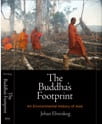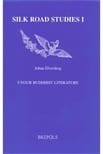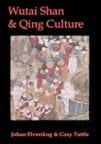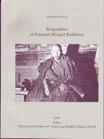Books
 The Buddha’s Footprint
The Buddha’s Footprint
In the current popular imagination, Buddhism is often understood to be a religion intrinsically concerned with the environment. However, in The Buddha’s Footprint, Johan Elverskog contends that only by jettisoning this contemporary image of Buddhism as a purely ascetic and apolitical tradition of contemplation can we see the true nature of the Dharma and thus the environmental history of Asia.
 Buddhism and Islam on the Silk Road
Buddhism and Islam on the Silk Road
Winner of the 2011 Award for Excellence in the Historical Study of Religion from the American Academy of Religion
Selected by Choice magazine as an Outstanding Academic Title for 2010
“It should become required reading not only for every student and scholar of religions, but also for every scholar and student of history. One could also wish it would become required reading for our politicians and religious leaders.” – History of Religions
 Our Great Qing: The Mongols, Buddhism and the State in Late Imperial China
Our Great Qing: The Mongols, Buddhism and the State in Late Imperial China
“Masterful . . . represents an important contribution to the ‘new Qing history’ that is now changing the image of late imperial China by offering more nuanced interpretations of this period.” – International Journal of Asian Studies
 Uyghur Buddhist Literature
Uyghur Buddhist Literature
“Elverskog deserves praise for his careful work in an important… area of Buddhist studies.” – Buddhist Studies in Review
Translations
 The Pearl Rosary: Mongol Historiography in Early Ninetenth Century Ordos
The Pearl Rosary: Mongol Historiography in Early Ninetenth Century Ordos
“The latest addition to the relatively small collection of works on Mongolian historiography is Johan Elverskog’s … translation of the 1927 Mukden edition of Subud erike kemekü bicig [… with] an informative introduction.” – Mongolian Studies
 The Jewel Translucent Sutra: Altan Khan and the Mongols in the Sixteenth Century
The Jewel Translucent Sutra: Altan Khan and the Mongols in the Sixteenth Century
“Elverskog’s critical edition… is a major contribution to Mongolian studies and East Asian sixteenth-century history.” – Journal of Asian Studies
Edited Content
 Cosmopolitanism in China
Cosmopolitanism in China
“By exploring the historical links between Confucian cosmology, imperial ideology, political identities and interests, Cosmopolitanism in China changes the terms of understanding cosmopolitanism. It throws into relief the special character of cosmopolitanisms in Europe, South Asia and other parts of the world and thus begins the task of building a true cosmopolitanism for the planet.” – Prasenjit Duara, Duke University
 Wutai Shan and Qing Culture
Wutai Shan and Qing Culture
Available at http://www.thlib.org/collections/texts/jiats/
 Biographies of Eminent Mongol Buddhists
Biographies of Eminent Mongol Buddhists
“Cet ouvrage, qui oscille entre particularisme du bouddhisme mongolo-bouriate et «universalisme» du bouddhisme tibétain sera utile à tout chercheur travaillant sur le bouddhisme tibéto-mongol.” – Études mongoles et sibériennes, centrasiatiques et tibétaines